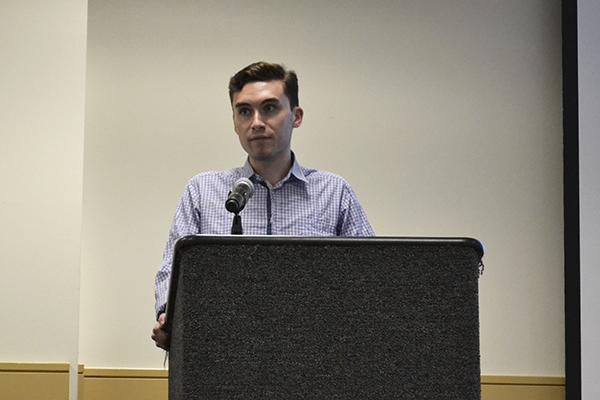Updated: Oct. 15, 2015 at 4:30 p.m.
As another senator leaves the Student Association Senate, questions remain as to who will fill the now seven open seats on GW’s student governing body.
The former chair of the finance committee Nancy Mannebach resigned from the senate Monday night, leaving seven open spots in the group. Now the senate, which has faced criticism in past years for high rates of turnover, faces the task of not only bringing in new members but also training the new senators in SA procedures.
Mannebach declined to comment further on her resignation.
Mannebach’s resignation leaves a third U-at-Large seat open, in addition to four graduate-at-large positions. Paden Gallagher, vice chair of the finance committee, will serve as interim chair until Oct. 26, the next Student Association Senate meeting. At that meeting, the senate plans to fill all seven seats, Thomas Falcigno, chair of the leadership committee, said.
Falcigno said he expects the leadership committee to sift through about 40 applications for the undergraduate positions and about 15 for the graduate positions. The committee will choose candidates to be approved at the meeting.
“A lot of applicants have seen how we operate,” he said. “They’ve sat in on meetings.”
After the appointments, he said he planned to assign at least two of the new senators to the finance committee, which has had two senators resign this year. He will also meet with the new appointees to go over SA Senate bylaws.
Falcigno said the leadership committee is looking for applicants who have concrete and realistic ideas and will be able to jump into active roles on the SA.
“At the end of the day, our job is to advocate,” he said. “I’m looking for candidates with good ideas, timelines for projects.”
Last year, the senate did not fill its empty chairs until January, Falcigno said.
The SA Senate is also passing more substantive legislation by holding senators more accountable for the execution of their initiatives, Falcigno said. He said the leadership committee is also stringently “screening” the resolutions senators hope to pass for plausibility this semester.
Falcigno also cited a senate policy, which asks senators to provide updates to the senate two weeks after a bill they sponsored is passed. The accountability, he said, “keeps senators on their toes.”
“You haven’t seen a bill passed without meat on it,” he said.
Syron said the seven empty senate seats are “if anything, a positive for the senate.”
“It’s a great way to not only improve the overall goal of the Student Association, but to have different viewpoints integrated into the senate,” he said. “It’s a really amazing opportunity, where the goals [of new senators] are going to be working on are just another opportunity for the Student Association to advocate for more interests on campus.”
Syron said he doesn’t expect the three empty U-at-Large seats to impact the only U-at-Large senator currently serving on the SA, Sean Kumnick.
“I wouldn’t say this is going to affect Sean a lot,” Syron said.
On Monday night, Kumnick said he is “looking for people that are willing to work with everybody else” in the new senators. He added that he would “love” it if Gallagher took over as the permanent chair for the group.
This post was updated to reflect the following corrections:
The Hatchet incorrectly reported that the policy that requires senators to provide updates to the senate after bills they sponsored are passed is new. The policy is in the Student Association’s bylaws, but has not been enforced in recent history. The Hatchet incorrectly reported that seven senators have left the group since March. Four senators have resigned and three seats were not filled during elections. We regret these errors.








